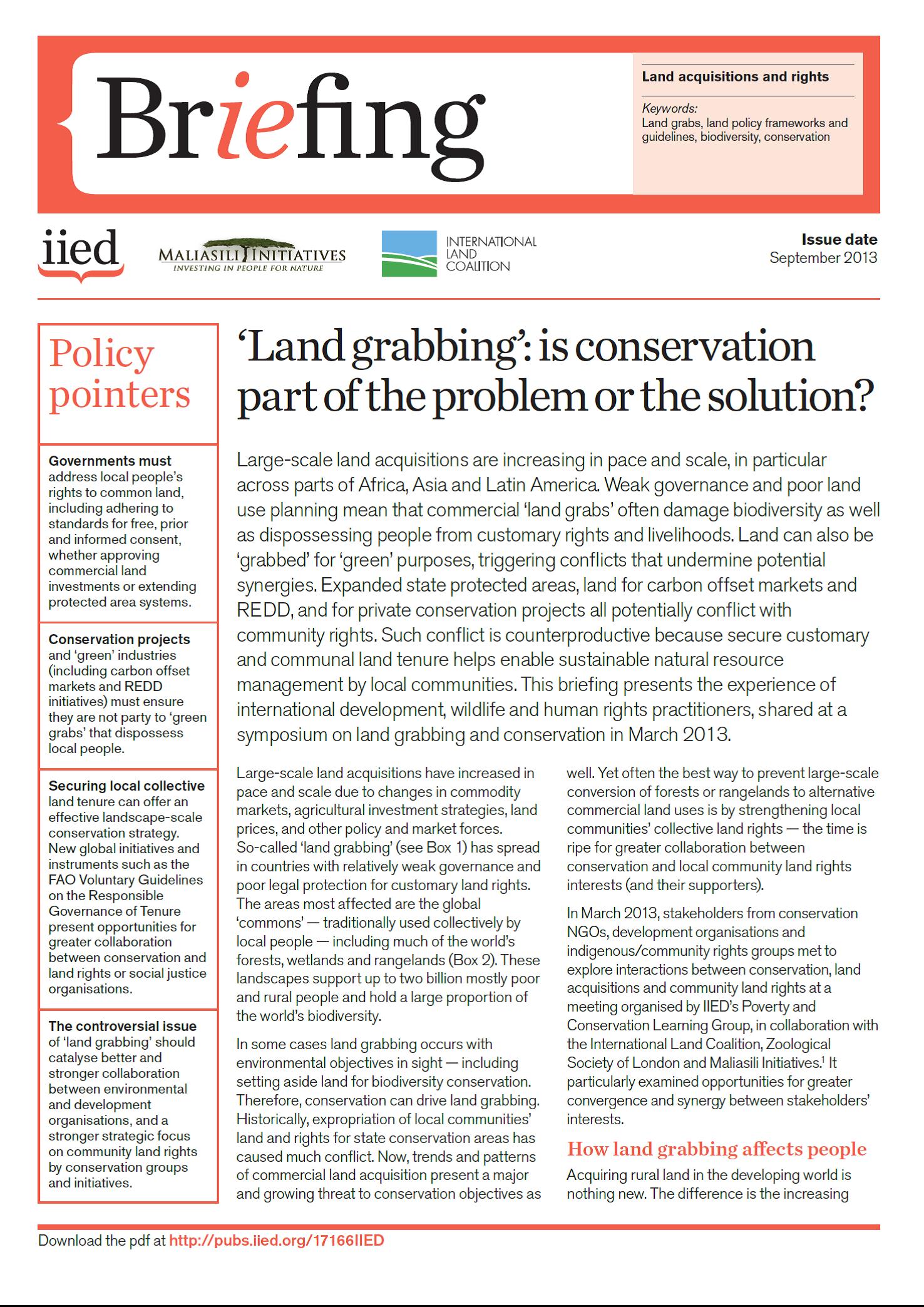Location
The International Land Coalition (ILC) is a coalition of civil society and intergovernmental organizations promoting secure and equitable access to and control over land for poor women and men through advocacy, dialogue and capacity building.
Resources
Displaying 161 - 165 of 258‘Land grabbing’: is conservation part of the problem or the solution?
Large-scale land acquisitions are increasing in pace and scale, in particular across parts of Africa, Asia and Latin America. Weak governance and poor land use planning mean that commercial ‘land grabs’ often damage biodiversity as well as dispossessing people from customary rights and livelihoods. Land can also be ‘grabbed’ for ‘green’ purposes, triggering conflicts that undermine potential synergies. Expanded state protected areas, land for carbon offset markets and REDD, and for private conservation projects all potentially conflict with community rights.
‘Land grabbing’: is conservation part of the problem or the solution?
Large-scale land acquisitions are increasing in pace and scale, in particular across parts of Africa, Asia and Latin America. Weak governance and poor land use planning mean that commercial ‘land grabs’ often damage biodiversity as well as dispossessing people from customary rights and livelihoods. Land can also be ‘grabbed’ for ‘green’ purposes, triggering conflicts that undermine potential synergies. Expanded state protected areas, land for carbon offset markets and REDD, and for private conservation projects all potentially conflict with community rights.
‘Land grabbing’: is conservation part of the problem or the solution?
Large-scale land acquisitions are increasing in pace and scale, in particular across parts of Africa, Asia and Latin America. Weak governance and poor land use planning mean that commercial ‘land grabs’ often damage biodiversity as well as dispossessing people from customary rights and livelihoods. Land can also be ‘grabbed’ for ‘green’ purposes, triggering conflicts that undermine potential synergies. Expanded state protected areas, land for carbon offset markets and REDD, and for private conservation projects all potentially conflict with community rights.
‘Land grabbing’: is conservation part of the problem or the solution?
Large-scale land acquisitions are increasing in pace and scale, in particular across parts of Africa, Asia and Latin America. Weak governance and poor land use planning mean that commercial ‘land grabs’ often damage biodiversity as well as dispossessing people from customary rights and livelihoods. Land can also be ‘grabbed’ for ‘green’ purposes, triggering conflicts that undermine potential synergies. Expanded state protected areas, land for carbon offset markets and REDD, and for private conservation projects all potentially conflict with community rights.
CONSERVATION AND LAND GRABBING: PART OF THE SOLUTION OR PART OF THE PROBLEM?
2.0 OTHER RECENT EVENTS 5.0 MAASAI WOMEN LEAD STRUGGLE TO PROTECT LAND RIGHTS IN RECENT ROUNDS OF LOLIONDO CONFLICT 6.0 PARTICIPATORY RANGELAND MANAGEMENT (PRM): AN EFFECTIVE PROCESS FOR ETHIOPIA’S PASTORAL COMMUNAL LANDS? 7.0 NEW HOPE FOR THE TANA DELTA, KENYA 8.0 PASTORAL RESOURCE MAPPING AT SCALE,TO SUPPORT CLIMATE RESILIENT LIVESTOCK KEEPING IN TANZANIA 9.0 PASTORAL PEOPLES’ PARLIAMENT INDIA - A PLATFORM FOR THE UNHEARD, THE UNSEEN 11.0 OPPORTUNITIES FOR NEW LAND LAWS TO SUPPORT CBP&NRM IN MONGOLIA 12.0 ENDNOTES









